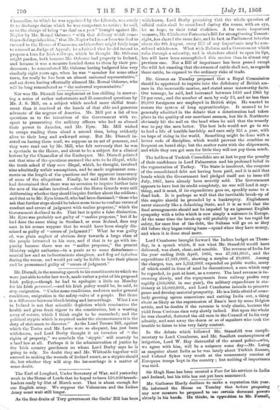Nor was Mr. Disraeli less unpleasant or less chilling in
answer- ing a series of rather unfortunate and ill-conceived questions by Mr. J. S. Mill, on a subject which needed more skilful treat- ment than it received at the hands of that able and generous advocate of the negroes of America. Mr. Mill put a list of ten questions as to the intentions of the Government with re- spect to prosecuting the military officers who had so abused their power in Jamaica, and Mr. Eyre. Mr. Mill wished to escape reading them aloud a second time, being evidently alive to their long and awkward array. But Mr. Disraeli in- sisted on having them read, we suppose as an act of penance, and they were read out by Mr. Mill, who felt nervously that he was a spectacle to the House, and about to be a subject for a clinical lecture by the Chancellor of the Exchequer. Mr. Disraeli pointed out that nine of tha questions assumed the acts to be illegal, while the tenth asked if they were illegal, which, he thought, involved nine admittedly unfair assumptions, and he made unpleasant com- ments on the length of the questions and the apparent inaccuracy of some of the allegations. Finally, he said that the Admiralty had determined that there was no occasion to inquire further into the acts of the sailors involved,—that the Horse Guards were still deliberating whether they should inquire further about the soldiers ; And that as to Mr. Eyre himself, who had been dismissed," those who ask that further steps should be taken seem to me to confuse errors of conduct and errors of judgment with malice prepense," which the .Government declined to do. That last is quite a false distinction. Mr. Eyre was probably not guilty of "malice prepense," but if he had done the same thing in Scotland, or even Ireland, does any man in his senses suppose that he would have been simply dis- missed as guilty of "errors of judgment 2" What he was guilty of, was plain neglect of obvious duty towards a large class of the people intrusted to his care, and if that is to go with im- punity because there was no " malice prepense," the present Ministry might authorize—in a panic as to some disturbance— martial law and an indiscriminate slaughter, and flog ad infinitum during the recess, and would yet only be liable to lose their places and be pronounced guilty of "errors of judgment."






























 Previous page
Previous page